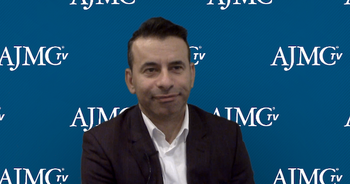
Jason Mitchell, MD, chief medical and clinical transformation officer, Presbyterian Healthcare Services, discusses the role of commercial payers in the shift toward value-based care.

Jason Mitchell, MD, chief medical and clinical transformation officer, Presbyterian Healthcare Services, discusses the role of commercial payers in the shift toward value-based care.

Data is critical to all value-based care, said Jason Mitchell, MD, chief medical and clinical transformation officer, Presbyterian Healthcare Services.

You have to think beyond a patient's disease process and think about how they engage with the healthcare system, explained Jason Mitchell, MD, chief medical and clinical transformation officer, Presbyterian Healthcare Services.

Jason Mitchell, MD, chief medical and clinical transformation officer, Presbyterian Healthcare Services, discusses which payment models have the most potential for succeeding in value-based care.

One of the first things you need to do to ensure scalability and sustainability of social determinants of health (SDOH) initiatives is to really understand your population, explained Susan Mani, MD, vice president of Clinical Transformation and Ambulatory Quality at LifeBridge Health.

One of the most important things you can do to align healthcare strategies in the shift toward value-based care is to allow your clinicians to be part of that journey, explained Jason Mitchell, MD, chief medical and clinical transformation officer, Presbyterian Healthcare Services.

Group purchasing organizations have an important purpose in healthcare, but there are some concerns, explained Martin Makary, MD, MPH, a surgical oncologist and chief of the Johns Hopkins Islet Transplant Center.

Susan Mani, MD, vice president of Clinical Transformation and Ambulatory Quality at LifeBridge Health, discusses barriers to understanding the return on investment of social determinants of health initiatives.

Jason Mitchell, MD, chief medical and clinical transformation officer, Presbyterian Healthcare Services, discusses how freestanding emergency departments can be utilized in the move toward value-based care.

Pharmacy benefit managers (PBMs), have historically been a black box for those paying into them, partly because medications are confusing, explained Martin Makary, MD, MPH, a surgical oncologist and chief of the Johns Hopkins Islet Transplant Center.

Looking at readmissions for congestive heart failure, we realized that the majority of our patients were being readmitted because of care coordination and social determinants of health, explained Susan Mani, MD, vice president of Clinical Transformation and Ambulatory Quality at LifeBridge Health.

Martin Makary, MD, MPH, a surgical oncologist and chief of the Johns Hopkins Islet Transplant Center, dicscusses how hospitals have responded to having to post standard charges of their services online by uploading their chargemasters.

If you wait for lagging outcomes, such as readmissions, it may be months before you realize if the initiative is working or not, explained Susan Mani, MD, vice president of Clinical Transformation and Ambulatory Quality at LifeBridge Health.

During a session at World Health Care Congress 2019, Senator Bill Cassidy, MD, offered his alternative to Medicare for All, which is modeled after the Children’s Health Insurance Program, and discussed other healthcare issues on his radar.

A panel discussion during World Health Care Congress 2019 discussed the importance of quantifying and communicating the return on investment (ROI) for social determinants of health (SDOH) initiatives.

More and more, older adults are choosing to receive care in their homes rather than in the hospital. While technology has a role in aiding home-based care for older patients by allowing providers to implement remote monitoring, these technologies must be met with care management in order for outcomes to truly be improved, according to a panel discussion at World Health Care Congress 2019.

In his first speech since stepping down as FDA commissioner, Scott Gottlieb, MD, reflected on his time in office during a session at World Health Care Congress 2019.

During a World Health Care Congress 2019 panel discussion on unlocking innovation in value-based care, panel members offered a comprehensive look at what’s driving this shift toward value-based care, what works and what doesn’t, and where consolidation fits into the mix.

Artificial intelligence (AI) and AI-enabled devices are already making their way into the market and should be able to help make meaning of data in order to improve care delivery, said speakers at the 15th Annual World Health Care Congress.

Tom Price, MD, former HHS secretary, identifies key principles to keep in mind as the political parties move forward with any health policy changes.

At the 15th Annual World Health Care Congress, CMS Administrator Seema Verma highlighted new policies and initiatives from CMS to ensure that programs are delivering high-quality care in a sustainable way as healthcare spending continues to grow at a faster rate than the overall US economy.

A shift in care delivery and the availability of data are helping to make value-based care a reality in the United States, but the change has been taking too long, said panelists at the 15th Annual World Health Care Congress.

259 Prospect Plains Rd, Bldg H
Cranbury, NJ 08512
© 2025 MJH Life Sciences®
All rights reserved.
